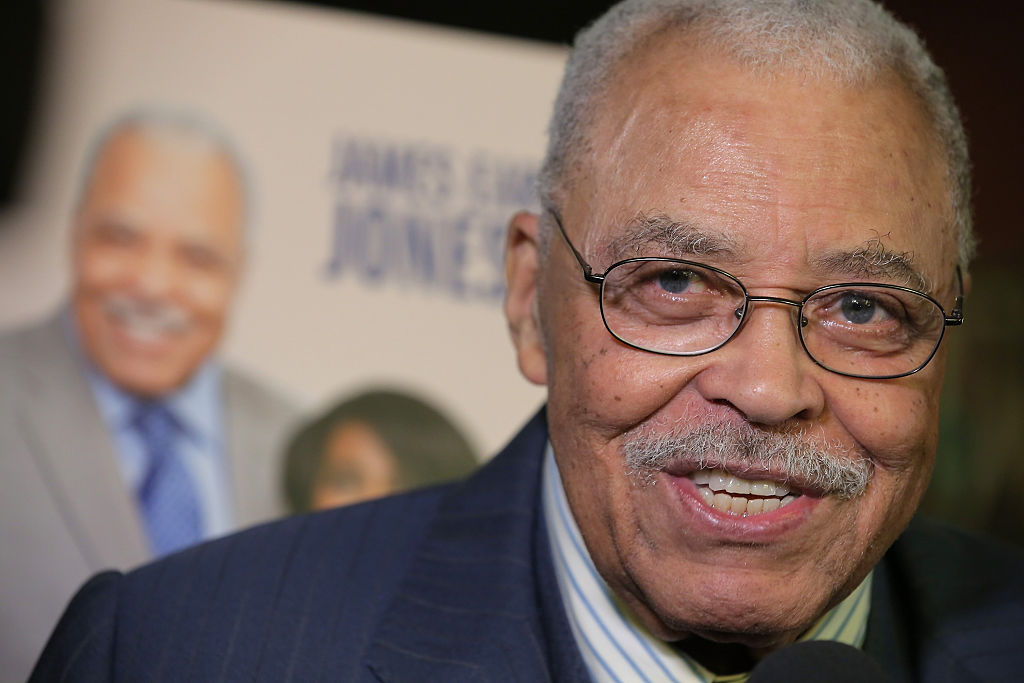
James Earl Jones, best known for his signature baritone voice. His voice has graced some of the best blockbuster movies, from being the voice of Darth Vader in the Star Wars trilogy, or as the voice of Mufasa in The Lion King, or as the King of Zamunda in Eddie Murphy's Coming To America, and in Field of Dreams with Kevin Costner, you know James' voice when you hear it.
But it hasn't always been this way. James Earl Jones, with one of the most recognizable voices in the world, was almost mute as a child for eight years, thanks to a severe stutter.
"As a small child, I would communicate to my family, or at least those who didn't mind being embarrassed by my stutter or my being embarrassed. I did communicate with the animals quite freely, but then that's calling the hogs, the cows, the chickens. They don't care how you sound, they just want to hear your voice."
RELATED: Who Knew?! NBA All-Star Shaq Used To Stutter, Too!
More than 70 million people worldwide stutter, which is about 1% of the population. In the United States, that's over 3 million Americans who stutter.
James Earl explains that although he was born in Mississippi, his family moved when he was five years old to a Michigan farm, which played havoc with his sinuses - and his speech development.
The move that uprooted his family, including his maternal grandparents and his mother (his father was out of the picture before he was born), and 13 cousins, was understandably traumatizing.

"I had an Uncle Randy - who passed away last year - who was my brother really. I was the youngest grandchild and he was the youngest child and only four years older than me. Randy stuttered while we lived in Mississippi and I feel that I mocked him,' he says. 'I used to imitate him. I don't know whether I was imitating him to keep him company or to embarrass him. And then I ended up stuttering myself. I feel I was cursed."
"Stuttering is painful. In Sunday school, I'd try to read my lessons and the children behind me were falling on the floor with laughter."
"Well, I knew I was funny. I still know why it is funny. I think stutterers are funny. And I know it's rude and politically incorrect to laugh at stutterers. But I think it is OK because I know why they're funny. They make people nervous. People think, when on earth are they going to get the word out, so they start laughing out of their own nervousness."
"But by the time I got to school, my stuttering was so bad that I gave up trying to speak properly."
"There was another pupil who sat behind me who was also a stutterer and the teacher, who was young, would shake him, and I'd say, 'L-l-lll-l-let me teach him' and I took over his studies, or when he had to talk. I understood him. I understood that shaking him was not going to help. She was relieved."
Jones was lucky enough to be taught by English teacher and poet, Donald Crouch, whom he calls...
..."the father of my voice". He was a contemporary of Robert Frost, and memorized a poem every day in case he ever went blind so he might have poems he could read in his head.
"I had started writing poetry in high school and he said of one of them, 'Jim, this is a good poem. In fact, it is so good I don't think you wrote it. I think you plagiarized it. If you want to prove you wrote it, you must stand in front of the class and recite it by memory.' Which I did. As they were my own words, I got through it."
His teacher argued that if James Earl wanted to be 'involved with words' he would have to be able to say them and read to the class and work on the stuttering problem.
"And he got me engaged in the debating class, the dramatic reading class, and so on. He got me talking, and reading poetry - Edgar Allan Poe was my favorite."
He said, "You have gone from having the voice of a child when you last spoke, to a voice of an adult when you resumed speaking. Don't be impressed. It's easy for you to start listening to yourself. If you do, nobody else will."
"And what he meant was that if you become so conscious about it you become too busy making all those deep S-O-U-N-D-S," and he lets the word echo in his booming voice.
Jones went on to study drama at Michigan University, by which time, he says, he had got a grip on his stutter. He says that although some people grow out of their speech impediment, he will always be a stutterer.
"I've learned that sometimes the synapses in your brain trip up, like stumbling on a sidewalk."
Certain consonants, he says, set off a stutter (such as M) so he avoids them. But there is a great advantage for stutterers, he says, as they develop a greater vocabulary because they ' have to have more choices of words at their disposal.
Coming to terms with his stutter was just a part of his amazing journey, in the past few years, James "accidentally" received a diagnosis that he says took him by complete surprise.
Now, Jones is sharing with everyone for the first time about how he's lived with Diabetes and what his health looks like going forward.
"I fell asleep on the bench in the middle of the gymnasium," he tells, AOL. "The doctor who happened to be there told me, 'That's not normal.' I took the test, and there it was. Type 2 diabetes. And it hit me like a thunderbolt."
MUST READ: J. Anthony Brown Tackles The New "Type 3" Diabetes
Jones said that even though he knew he was "at-risk" because he was Black, and his old age plus his family's medical history, he didn't feel like he had any disease and was shocked to hear the diagnosis.
"I'd been fit, climbing up mountains and skiing uphill and all that. I thought I was invincible, as the army teaches you to think of yourself, so it was a shock. There's a lot of denial," he said. "I'm still grappling with ways to live with it."
Type 2 diabetes, which affects over 29 million people in the U.S. And one of the ways that helps those who are affected by the disease is to adopt a healthier lifestyle. Eating your "normal" every day meals can alter blood sugar levels, especially for the 89 million Americans whose numbers categorize them as pre-diabetes, which Anderson says is much easier said than done.
Jones was forced to make tough changes which included cutting out his favorite dessert, strawberry shortcake. But he said he wouldn't have be able to do it without help from his wife and his son, who keep a close eye on his behavior.
See, when you have #diabetes, it not only affects you, it affects the people around you as well.
"My son is a good watchdog, and he's the first to catch me. My wife will count the cookies in the kitchen, but he will smell it in my breath. These are stupid things on my part, but it's human to love sugar, and next to denial is trying to get away with it."
When asked why he's opening up about it now, Jones' answer was simple: It's time.
"I have been working pretty steadily for the past 60, 70 years, and I haven't had a moment to commit myself to something like this. I'll get back to work, but I'll work more effectively once I come to terms with my ongoing problem with diabetes. I accepted I will always be a diabetic, but I can live a full life," he said.
For Jones, living a full life means continuing to do what he loves and adding to his nearly-200 acting and voice work credits.
"I'm an actor, and actors can work until they fall over, as long as you don't knock over the furniture and remember the lines. And that's what I intend to do, because I love it. I think I want to do comedy now. At my age, if you're going to make an ass of yourself, you can do comedy. I'm ready for that," he said.









